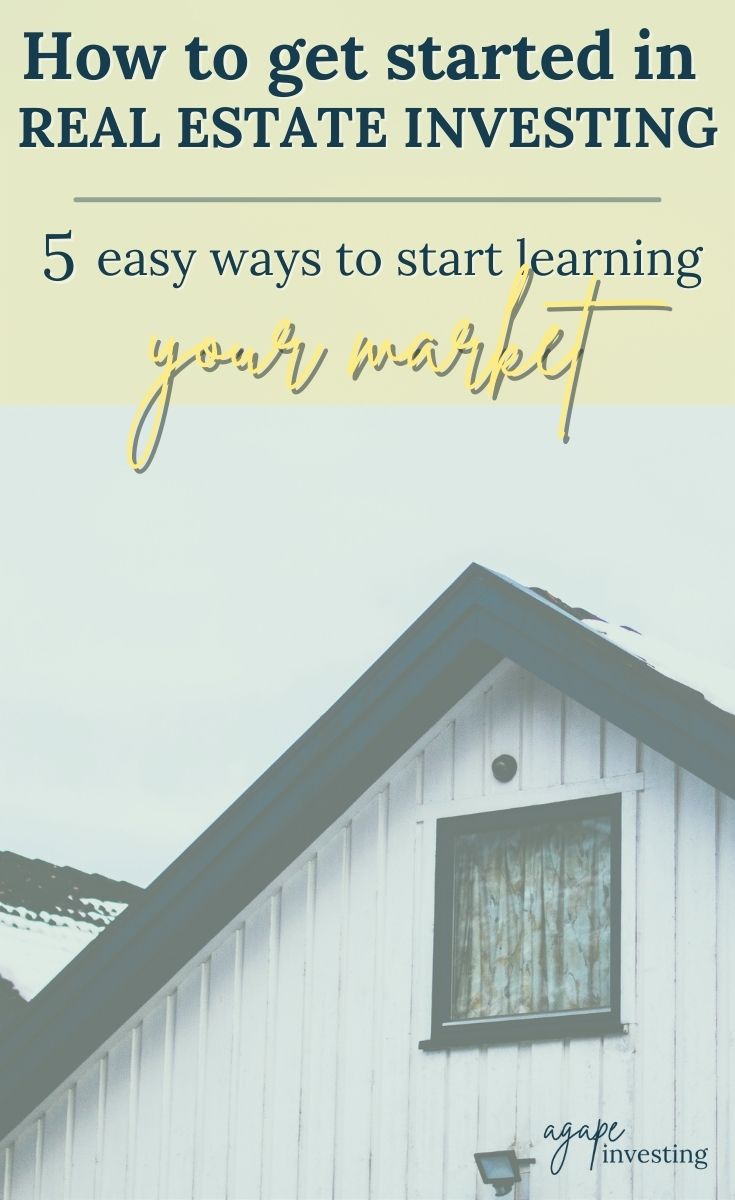This post may contain affiliate links, which help us generate revenue so that we can keep producing awesome content for you. We want to thank you from the bottom of our hearts for using our links and giving us the opportunity to share a sliver of this great big world with you.
As an Amazon Associate, I earn from qualifying purchases.
5 Ways You Can Start Learning Your Real Estate Market
Before we bought our first investment property, I was really nervous to invest out of state. I didn’t know anything about other cities or their markets. But instead of letting that stop me, I decided to learn everything I could about whatever area I was going to invest in!
Understanding the market you are investing in is crucial to the success of your investments. By knowing your market well, and picking up on trends, you will be able to spot deals before anyone else.
So here are 5 ways you can begin to learn your real estate market. These are great tips if you have already selected a market to invest in or you’re still picking one out. They are also all things that you can start today!

What to Learn About Your Market
Before you get started with your market analysis, make a checklist of things you should learn about your market.
- Crime rates
- Renter profile
- Rental rates
- Median home value
- Cost of living
- Job growth & diversity
- Population growth
- New construction
Each one of these factors will impact your investments. They are the things you need to know about your market in order to make an informed decision on whether or not something is a good deal.
Related: 3 Reasons Your Property Isn’t Renting
5 Tips On How to Do Market Research
Here are 5 tips on how to do market research based on what I have done, and what I have learned from others.
1. Recommendations
When you hear about a new product from a trusted friend you are more likely to buy that product than if you just came across it in the store.
If you’re not sure where you want to invest yet, talk to experienced real estate investors to see what locations are working well for them.
Ask questions like:
– Where have you seen a lot of growth?
– Do you have a favorite market to invest in? Why?
– How do you determine where to invest?
– What is the housing trend like in your market?
Start asking around to hear where people are finding good deals and getting great returns. Try talking with people on the BiggerPockets forums, or go to some real estate Meetups in your area.
This is why networking is so important! The people you know can help to connect you with other people they know. They can recommend areas that have worked for them, or get you in contact with someone who is having success in a certain area.
Related: 6 Ways to Get a Free Education
2. Connecting With Local Professionals Experts
Not only are other investors a great way to learn your market but talking with local professionals and experts is too. These are the people who will know a lot about the ins and outs of the market over a long period of time.
Typically they are able to give you most of the answers you are looking for when it comes to local growth, values, tenant profiles, etc.
What experts should you connect with?

- Real estate agents
- Property managers
- Contractors
- Lenders
I usually find these people by posting on the BiggerPockets forums letting everyone know what it is I am looking to find out. Most people in the forums are extremely helpful and looking to assist other investors; new and old. This is how I found our agent in Indiana.
When connecting with local experts, you want to find out which neighborhoods are attracting good renters. What is is that renters like in rental properties. Ask about the median prices of houses as well as the rental rates.
Related: The Difference Between Investor-Friendly and Investor-Experienced Agents
During phone calls, make sure to take as many notes as possible and find out how you can follow up with them in the future if you have more questions. Try to be respectful of their time; getting an email address might be best for future conversations.
Making these phone calls might be a bit nerve-racking at first! But once you make that call you will be thankful for going through with it. Even if the call doesn’t yield a lot of new information, you will at least make one new connection.
Understand that the person on the other end of the phone is human too. You may mess up your words a bit, but over time it will get easier. Each phone call will feel a little more comfortable. Eventually, you may be excited about the next phone call and the new information you will learn as well as the new connection you will make.
3. Watching the Market From Online
No matter where you decide to invest in real estate, whether in your own city or out of state, it is always important to know your market well. This means that you know what the median prices for properties generally are, and you understand which neighborhoods are more attractive to renters. So learn your market by watching what happens in it.
Before technology came around, watching the market used to be very difficult. You had to have a real estate agent who held all the information about properties for sale, or you had to drive neighborhoods on a hunt for for-sale signs. That would make it extremely difficult to invest out of state.
With so much knowledge available with the click of a button, watching the market has become super simple! The MLS is usually the best source for property information – but you do still need a real estate agent to give you access online in order to use it.
MLS Portal
If you haven’t connected with a real estate agent yet, your next best options are MLS portals like Redfin, Realtor, Zillow, or Trulia.
Each site is great for individual reasons. I use a combination of all four of them when I am browsing around. Sometimes one of the sites will have a property that another one doesn’t have.

Trulia is extremely helpful when scoping out details on specific areas. They have different heat maps showing data on plenty of the things you would want to know about each neighborhood. I like to use Trulia to find out the crime rates in the area, as well as find good schools throughout the city.
These MLS portals can have most of the information you might want.
– Asking prices
– Price reductions
– Home amenities
– Actual sale price
And most of the time, you can use Google Earth to “walk around” the neighborhoods to get a better feel for the area.
Just be careful because these sites aren’t always completely accurate or up to date. The MLS is still the true source for all property listings.
4. ListSource.com
ListSource is a site that I learned about more recently that I have been utilizing in my research on new cities.
ListSource is a website where you can actually purchase lists of homeowner information based on the criteria you are looking for. Plenty of investors use this site to help generate new leads for potential properties to purchase.
Even though that is the main purpose of the site, that is not what I am doing with it. I am not paying for any lists of information, I’m generating some lists to simply get some numbers. Let me explain.
Typically when an investor is going through ListSource they are putting in qualifying parameters to describe the types of properties they are looking for. Well, I can put in my own parameters to describe the kind of properties that I would look for if I were purchasing in that area.
I would first put in the geography, the dates of properties being sold (typically the last few months), the type of property, and you can even put in the parameters for not owner-occupied properties. That typically means that it was an investor who bought the house.
Once I have all the data in, I act as though I am going to purchase the list. When going through that process you can pull down a list to show you how many homes were sold using your parameters in those zip codes in the last couple of months. That is the number I want.

Why do I want that number?
Well, that number tells me how many investors have most likely purchased properties in the last few months in each of the zip codes. If that zip code has a small number, that means investors aren’t purchasing properties over there. Obviously the higher the count is the more likely it is that investors are targeting that area. There has to be a reason that the number is so high – most likely that it is a great area to invest in.
It is sort of like cheating the system in order to learn your market. Instead of talking to a bunch of investors and finding out the best places to buy investment properties, you can see by the numbers where they are. Now I know what zip codes I should be targeting!
This is a very brief description of how to use this tool. I would highly recommend reading the book Finding and Funding Great Deals, by Anson Young. This is where I found out about this awesome tool, and he walks you through the details step-by-step!
5. USA.com
This is another website that has been helpful in getting to know different areas. It has a lot of data on every zip code in the USA. I typically take the zip codes I collected from ListSource and look them up at USA.com to get more data on them.
You can also find information on the state as a whole, counties, and individual cities. I like to use it to find information on household incomes, median home values and rent prices, occupations, and population growth. They put everything into easy to read graphs and charts.
All of the information you can learn on that site is useful in some way and can help you to better understand the areas you invest in.
PIN THIS FOR LATER!
Go Learn Your Market
I encourage you to become your own experts on the market you are investing in. Learn everything you can about that area and also keep up with future changes.
This knowledge you are acquiring will only help you make better, more informed decisions when investing. So get going on your own research to learn your market so you can make great investments!
How are you learning your real estate market?
Already have rental properties and looking for a property manager? Check out our Ultimate Property Manager Question Guide full of over 100 questions to possibly ask a property manager!




